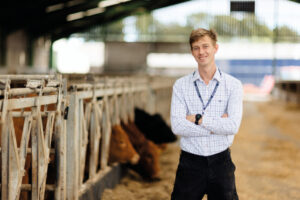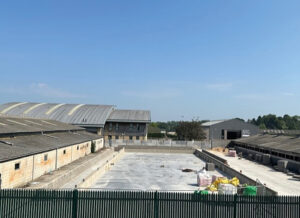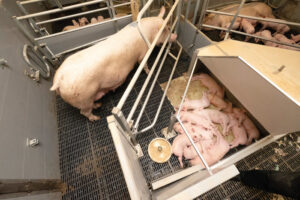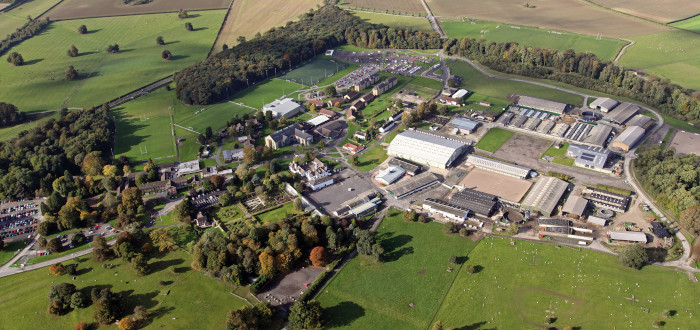James Richardson, farm manager at Bishop Burton College in Beverley, East Yorkshire, is masterminding a new £1 million pig unit, aiming to help plug the skills shortage in pig farming when it opens this autumn. Simon King paid him a visit.
Bishop Burton College, which has long been synonymous with the pig industry, is doing its bit to inspire young people to take up new careers in the sector with a major £1 million investment in a pig unit for its students.
 The development is being masterminded by James Richardson, a former student of the Yorkshire college from 2008 to 2010. After moving home to work on his family’s beef and sheep hill farm in Derbyshire and then working for Dyson Farming as a herdsperson in 2019, he returned to Bishop Burton as farm manager in 2021, overseeing the commercial farm, while working with students and academics to ensure they are learning from the facilities on campus.
The development is being masterminded by James Richardson, a former student of the Yorkshire college from 2008 to 2010. After moving home to work on his family’s beef and sheep hill farm in Derbyshire and then working for Dyson Farming as a herdsperson in 2019, he returned to Bishop Burton as farm manager in 2021, overseeing the commercial farm, while working with students and academics to ensure they are learning from the facilities on campus.
His passion lies in regenerative farming and achieving zero net carbon, while retaining very high standards of day-to-day operations and animal welfare.
“It’s fair to say, we’d gone through a period of decline on the farm,” he said. “We’ve got great infrastructure and some fantastic people and I’m pleased to say we’ve turned things around. We’re rebuilding, and part of this is the new pig unit.”
When James joined the college, it operated a bed and breakfast pig service for White Rose Farms. “We had 1,500 bacon pigs in four sheds, which were built in the mid 1980s and not in great condition. It was very labour- and straw-intensive and a costly way of doing B&B pigs,” he said.
“It just wasn’t working for anyone. I did one batch in the autumn of 2021 during the pig crisis. Pigs were too big and here for too long. We weren’t making money from it and the students weren’t getting a benefit.
“We were probably doing the pig industry a disservice in just getting students mucking pigs out – how we were keeping them isn’t how you find it in the modern industry.”
New pig unit
Plans were under way to build a new farrowing unit before James joined, and the project was given the green light to start building the day before the Covid lockdown was announced in March 2020.
“The original plan was for 750 sows, and it was utilising the old buildings as dry sow accommodation. I wasn’t entirely happy with reusing these old sheds – I had memories as a student of spending hours forking the same sheds out and we hadn’t moved on!”
Not long after he joined, he assumed the roles of farm manager and farm director, which meant taking on this project. “I went back to the drawing board and the economics of the project had changed hugely – I think we saw a 33% rise in the overall cost,” James said. “Instead of having an 750-sow unit, we decided to have a smaller unit and do a better job.”

The college decided to refit one of the one of the porphyrin buildings into dry sow accommodation, which then dictated how many sows the site could carry, and the size of the farrowing unit – 72 places across two rooms. “I’m proud that what we’re doing is industry leading. We will be at the cutting edge of indoor pig production, which, as a college, is where we need to be,” James said.
The college was previously home to the National Pig Training Centre. “It has had such an impact on the pig industry. We’re re-establishing Bishop Burton College as the place in the UK to come and learn about pig production,” James said.
The unit will be farrowing only, with piglets leaving the site at weaning to go to a White Rose Farms rearing unit. The project wouldn’t be happening without the support of White Rose, particularly Rick Buckle, another former student, he added.
“White Rose Farms will provide the pigs, the veterinary medicines and feed, and we will provide the fixed costs, the labour, the buildings, and everything else that comes with it,” he added.
“This will help us manage the commercial risk and being within the White Rose and wider Cranswick system gives us industry links that are so key for further education colleges. We’ve also got to be engaging with the employers that we’re producing students for.”
Plugging the skills shortage

The college has a large number of students, aged 16 to 19, with an interest in working with animals. “The pig unit will be here to help students consider a career in pig farming, which a lot of them wouldn’t have until they come to us,” James said.
“I’ve been recruiting staff for my team, and it’s been a real challenge. I think we’ve got to rebrand ourselves, or at least convey what an exciting career farming is and that it isn’t this negative stereotype of working 14-hour days and knee deep in muck, but it’s actually high tech and highly skilled – and it’s an incredibly rewarding career.
“The shortage of labour has certainly made me sit back and think about what we what we offer as an industry. If we want the best talent to work in agriculture, we need to be competing with the rest of the economy. When you’ve got people doing flexi time and packages that value work/life balance better than we do, we’re going to lose people.”
The project
The unit is close to a £1 million investment and one of the biggest challenges faced at the beginning of 2022 was price inflation and securing the materials. AM Warkup successfully won a retendering process and the unit is using its Freedom Farrowing design. “It’s very similar to the design at Leeds University, with a few tweaks, but we’ve gone for a slightly bigger pen size, without knowing what the minimum pen size is going to be.”
They have gone for a 6.5sqm pen in recognition partly of a focus on ‘having the highest standards of welfare’. “We want to give ourselves plenty of room to futureproof it, because in 10 years’ time, we don’t want it to be smaller than the standard,” James said. “AM Warkup’s freedom farrowing pens give us the ability to enclose the sow for however long we need to and, if we need to go in, from a safety point of view, we can pin the sow to the side of the pen.”
A viewing passage has been included and a public access path will be open 24 hours a day, where guests and the public can view the pigs, through double glazed windows, without compromising biosecurity.

flexible farrowing crates, like this one
“Managing biosecurity on an educational pig unit was always going to be a challenge,” James said. “Any staff or visitors will have to go through the shower in, shower off, process, whereas the students coming on, hopefully weekly, will have a slightly different protocol.
“They will come into the changing room. We’ll have a dividing bench through the middle of the changing room, and have a clean side and a dirty side. Students will also have to be at least 48 hours pig free before they can come back to the farm.”
When up and running, the unit will run a five-week batch farrowing system. “Serving and weaning are going to be our busiest times and, with the batch system and having that rigidity of knowing what’s happening when helps plan the academic year for students,” James explained.
In terms of nutrition, they have gone with Gestal electronic sow feeders, two per pen, allowing each sow’s nutrition to be individually managed. “If we want to run any trials, the unit will give us the data. We use a lot of cloud-based apps and we record everything,” he added.
Looking ahead
The aim is for the first pigs to arrive on November 6. “We will be fully stocked within a matter of weeks, with the support from White Rose Farms,” James said. “Our first farrowing should be in the first week in December.”
Once construction is complete, there will be an area available for future development. “I haven’t got funding for that but that’s my hope,” he said.
Future options include expanding farrowing capacity, or weaner shed and bacon sheds, to bring the whole process back on-site. “But that’s at least 10 years away,” James added.




